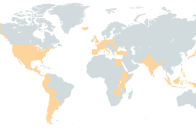
About us

Global Geothermal Alliance (GGA)
Launched at COP21*, the Global Geothermal Alliance (GGA) serves as a platform for dialogue, cooperation and coordinated action between the geothermal industry, policy makers and stakeholders worldwide.
As stated in the Joint Communiqué on the Global Geothermal Alliance, the GGA is a coalition for action to increase the use of geothermal energy, both in power generation and direct use of heat. It calls on governments, business and other stakeholders to support the deployment of realizable geothermal potential. The Alliance has an aspirational goal to achieve a five-fold growth in the installed capacity for geothermal power generation and more than two-fold growth in geothermal heating by 2030.
What the GGA is designed to do?
a) foster an enabling environment to attract investments in geothermal energy;
b) provide customised support to regions and countries with geothermal market potential;
c) facilitate the exchange of insights and experience among key stakeholders in the geothermal energy value chain;
d) identify and promote models for sharing and mitigating risks, in order to attract private investment and integrate geothermal facilities into energy markets.
e) help to streamline outreach efforts to give geothermal energy greater visibility in the global energy and climate debates.
* The 21st Conference of the Parties to the United Nations Framework Convention on Climate Change (UNFCCC), held in Paris, France, in December 2015
Members and Partners
Read more-

Members
Argentina, Azerbaijan, Bolivia, Burundi, Chile, Colombia, Comoros, Costa Rica, Djibouti, Dominica, Ecuador, Egypt, El Salvador, Ethiopia, Fiji, France, Germany, Grenada, Guatemala, Honduras, Iceland, India, Indonesia, Italy, Japan, Kenya, Kingdom of the Netherlands, Malawi, Malaysia, Mexico, Montserrat, New Zealand, Nicaragua, Pakistan, Panama, Papua New Guinea, Peru, Philippines, Poland, Portugal, Romania, Saint Vincent & the Grenadines, Saint Lucia, Solomon Islands, Spain, Switzerland, Tonga, Turkey, Uganda, United Kingdom of Great Britain and Northern Ireland, United Republic of Tanzania, United States of America, Uruguay, Vanuatu, Zambia, Zimbabwe
Partners
Data Progress
IRENA data shows global geothermal capacity rising steadily from 11.84 GW in 2015 to a projected 15.43 GW in 2024. Asia leads this growth, driven by Indonesia, the Philippines, and Japan, increasing from 3.90 GW to 5.13 GW. North America, mainly the U.S. and Mexico, grew modestly from 3.44 GW to 3.71 GW.
Africa, led by Kenya, nearly reached 0.95 GW by 2024. Eurasia, driven by Türkiye, more than doubled its capacity to 1.82 GW. Central America and the Caribbean saw modest growth, while Europe increased to 1.66 GW, led by Iceland and Italy.
In Oceania, New Zealand drove growth from 0.99 GW to 1.28 GW. South America, with Chile as a newcomer, reached 0.10 GW by 2023. Overall, geothermal energy is on a steady global rise, with key momentum in Asia, Eurasia, and Africa.
How to join?
The GGA is an inclusive and neutral multi-stakeholder platform that brings together public, private, intergovernmental and non-governmental actors that share a common vision of accelerating the deployment of geothermal energy for power generation and other applications.
Member countries include geothermal resource-rich countries with established or emerging geothermal markets, along with other countries that wish to support the activities of the Alliance.
Partner institutions include:
- Development partners, international and bilateral development organisations, international financial institutions, institutional investors, international organisations, and other development partners involved with geothermal energy.
- Geothermal industry represented by geothermal business associations at the global, regional and national levels.
- R&D and academic organisations operate in the geothermal energy field at regional, national or subnational levels.
The official Expression of Interest (EOI) letter to become a partner of the Global Geothermal Alliance should be sent to the International Renewable Energy Agency (IRENA), the coordinator and facilitator of the GGA, and addressed to:
Mr Francesco La Camera
Director General
International Renewable Energy Agency
Masdar, Abu Dhabi
United Arab Emirates
The EOI can be emailed to odg@irena.org and copied to gga@irena.org.
Member countries and partner institutions are not required to contribute any membership fee. The costs associated with GGA activities, including coordination meetings, shall be borne by participants.
GGA Action Plan
Read moreThe GGA Action Plan was endorsed by Members and Partners in May 2016, based on the principles stipulated in the GGA Joint Communique. It is set to coordinate closely with existing structures, programmes and facilities that share the common objective of promoting geothermal energy deployment at the international, regional and national levels. The Alliance will operate based on activities linked to the priority action areas identified in the GGA Action Plan, and will be supported in implementation as well as funding by committed Members and Partners.
Tools
Read moreRegional and International Training Centres
Read morePublications
Read more
This report, developed by IRENA and the International Geothermal Association under the Global Geothermal Alliance, outlines key trends shaping geothermal markets. It reviews regional and global developments in electricity, heating, and cooling, highlighting technology progress, cross-sector synergies, and policy impacts. The report offers insights and recommendations to advance geothermal energy worldwide.

The recommendations provided in this guidance address key challenges such as limited data on geothermal resources and heating demand, lack of enabling frameworks, financing gaps, and low awareness. The guidebook also proposes methods to set heat tariffs and measure socio-economic impacts to support decision-making in the agri-food sector.
Note: Publications prepared by the GGA Members and Partners




























































